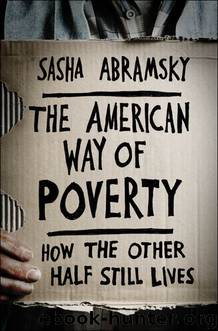The American Way of Poverty: How the Other Half Still Lives by Abramsky Sasha

Author:Abramsky, Sasha [Abramsky, Sasha]
Language: eng
Format: epub
ISBN: 9781568589558
Publisher: Nation Books
Published: 2013-09-10T00:00:00+00:00
INEQUALITY’S A GOOD THING . . . UNLESS YOU’RE POOR
The low-wage-low-benefit vortex generally affects not just individuals but whole communities. Bereft of opportunity, such locales prove unattractive to those with options—with education, with valued skills, with drive. These men and women tend to leave, to bigger cities, to other states. Left behind in small towns with only low-wage employment, the rest of the population face daunting prospects.
Drive into a speck on the map such as Caldwell, in Canyon County, Idaho, and one is instantly hit by a sense of futility. The storefronts are beaten up; the homes ramshackle, paint flecked, walls akimbo. On the afternoons that the local food pantry is giving out boxes of food, about half a mile from a sprawling, mean-looking trailer park nestled off to the side of a freeway on-ramp, the lines are quite simply immense.
Many of the pantry clients are out-of-work loggers. Others are farmers who can no longer make ends meet. Some are on disability. Several are on unemployment or welfare. There’s a Grapes of Wrath quality to their appearance, something weathered, stoic, patient. They stand in line by the score, still, quiet, under the large pantry logo of two palm trees rising up on the edge of a gorgeous blue sea, waiting for bags of old lettuces and onions, soggy cucumbers, frozen hot dogs and bologna, and lots of bread.
Not surprisingly, given this diet, most of the clients are chronically overweight. Others, like 60-year-old Robert Burke, a disabled ex-logger, trucker, and general jack-of-all-trades, in battered jeans, a faded green T-shirt, and a thick red-and-black parka, are skinnier, harder looking. “When you can’t afford it, you can’t afford it,” he said in simple explanation for why he was on line for free food, his sandy eyebrows raised slightly, his face deeply lined. “You’ve got to find it someplace. I’ve done ranch work, logged, trucked, worked on most everything I can work on. And now I can’t. I don’t feel right doing it [visiting the pantry]. But they give you canned goods, frozen food, meat, bread, potatoes, onions, carrots.” Two-thirds of his meals, he estimated, came from pantry donations. “I’m taking care of three grandkids, and they eat before I do. It’s hard. You go without what you can go without. Sometimes you go without fuel; sometimes you go without gas, propane—for cooking. I cook on open fire. Ever since the job situation has been going down, a lot of people been needing.” One-third of Burke’s friends were out of work. “Truck drivers, ranchers, some of them just been common laborers. A lot are on unemployment. People need it [food], got to get it. It hurts a lot of people.”
Download
The American Way of Poverty: How the Other Half Still Lives by Abramsky Sasha.epub
This site does not store any files on its server. We only index and link to content provided by other sites. Please contact the content providers to delete copyright contents if any and email us, we'll remove relevant links or contents immediately.
The Secret History by Donna Tartt(19053)
The Social Justice Warrior Handbook by Lisa De Pasquale(12187)
Thirteen Reasons Why by Jay Asher(8893)
This Is How You Lose Her by Junot Diaz(6877)
Weapons of Math Destruction by Cathy O'Neil(6265)
Zero to One by Peter Thiel(5787)
Beartown by Fredrik Backman(5737)
The Myth of the Strong Leader by Archie Brown(5500)
The Fire Next Time by James Baldwin(5431)
How Democracies Die by Steven Levitsky & Daniel Ziblatt(5215)
Promise Me, Dad by Joe Biden(5141)
Stone's Rules by Roger Stone(5081)
A Higher Loyalty: Truth, Lies, and Leadership by James Comey(4954)
100 Deadly Skills by Clint Emerson(4921)
Rise and Kill First by Ronen Bergman(4780)
Secrecy World by Jake Bernstein(4741)
The David Icke Guide to the Global Conspiracy (and how to end it) by David Icke(4709)
The Farm by Tom Rob Smith(4502)
The Doomsday Machine by Daniel Ellsberg(4484)
